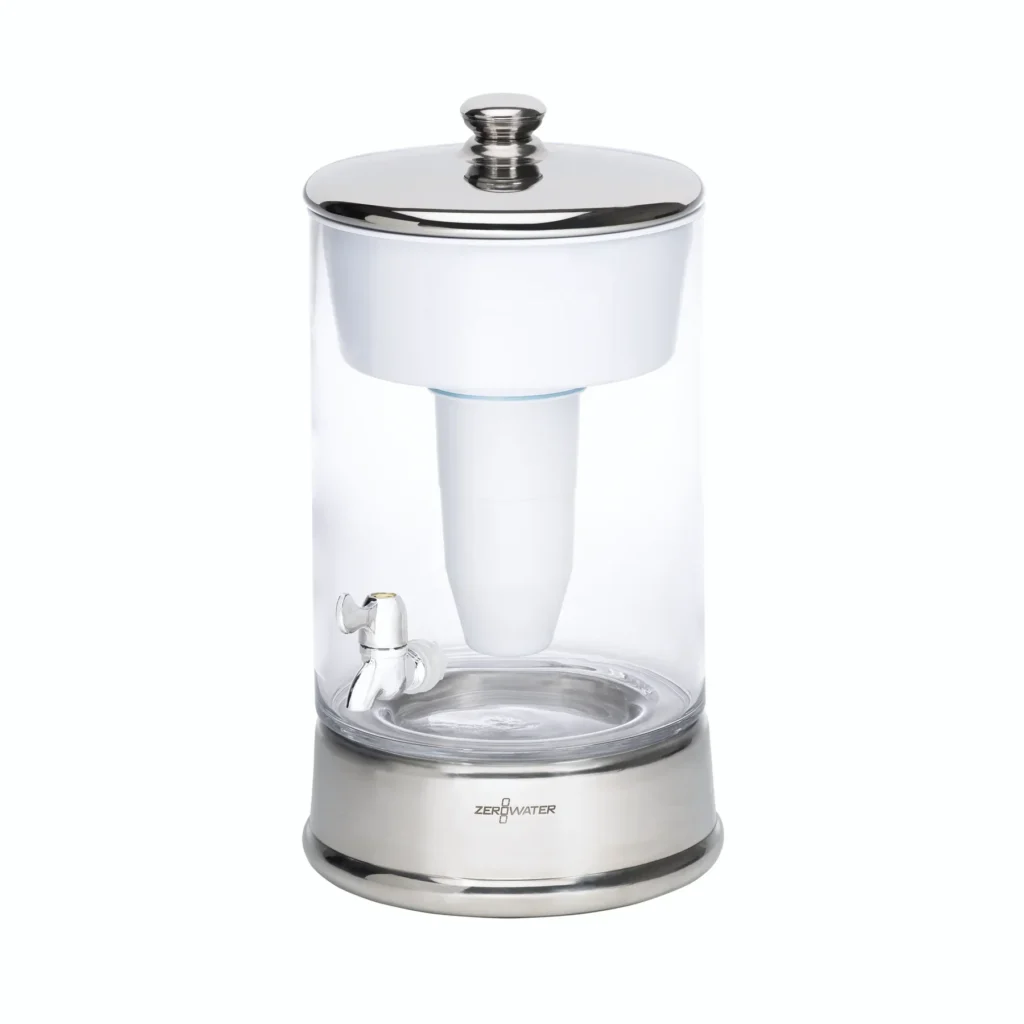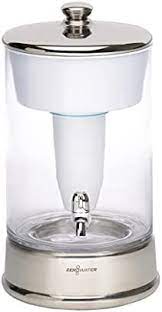ZeroWater’s 40 cup ready-pour filtered water dispenser has an elegant design, is certified to reduce lead, cadmium, and other heavy metals and chemicals, and doesn’t need complex installation. Here are the pros and cons of this convenient water filter pitcher.

Table of Contents
- NSF Certified
- Great for families
- BPA free, glass dispenser
- Beats the Big Berkey and at a better price
- Strips out essential minerals
- Spigot flakes after use
ZeroWater 40 Cup Ready Pour Glass Dispenser at a glance:
Certifications: NSF Standard 53
Filters: Lead, cadmium, other heavy metals, pesticides, TDS, and more
Made in: USA
Height: 18 inches
Diameter: 9 inches (spigot sticks out another 2 inches from the glass)
ZeroWater uses both activated carbon and ion exchange to reduce contaminants, including removing dust, rust, and other suspended solids. This pitcher removes 99.6% of total dissolved solids (TDS), which includes removing essential minerals such as calcium, magnesium, and potassium.
What we love about the ZeroWater 40 pitcher
ZeroWater’s 40 cup ready-pour filtered water dispenser has an elegant glass and chrome design with a no-drip spigot (which you may want to replace; more on this below).
Thanks to its 5-stage filtration system, the ZeroWater 40 is certified to NSF Standard 53, demonstrating that it can reduce both lead and chromium, as well as a range of other chemicals. This is rare for a pour-through water dispenser that operates without the pressure of tap water.
The ZeroWater 40 comes in a cardboard box (sadly, with plastic bag) that includes the dispenser, a TDS meter and two replacement filters. These filters help remove:
- Organic contaminants
- Pesticides
- Herbicides
- Mercury
- Chlorine
- Chloramine
- Inorganic compounds
- Metals
- Nonmetals
- Radiological contaminants.
The unit is certified BPA-free and is made of glass, not plastic, so it is easy to clean but quite heavy when filled (around 30 lb.).
Downsides to the ZeroWater 40 pitcher
Because this product is so effective at removing TDS and does not contain a remineralizer element, it can put users at risk of low intake of essential minerals. As such, if you only drink water from this pitcher, make sure you’re getting vital minerals such as calcium, magnesium, and potassium through your diet (or supplements where necessary).
The 40-cup (2.5 gallons) ZeroWater pitcher is a great choice for parties, gatherings, meetings, offices, or for general use at home. If you’re expecting a lot of thirsty guests, though, fill it up in advance as the filter rate is slow at 0.03 gallons per minute, or 15 minutes per half gallon, meaning it will take over an hour for the whole dispenser to fill with filtered water.
The biggest downside of the ZeroWater 40 used to be that the plastic and chrome spigot flaked, releasing metallic pieces into the filtered water.
As of December 2018, ZeroWater began coating the outside of the spigot only. Thankfully, this resolves the issue.
If you’re looking at a secondhand ZeroWater 40, check the spigot to see if it’s an older or newer model. If there is coating on the portion of the spigot that fits inside the glass, you might want to ditch the plastic altogether and replace the spigot with an inexpensive stainless steel spigot (View on Amazon).
ZeroWater vs. Big Black Berkey vs. Aquasana AQ-4000
The ZeroWater 40-Cup dispenser is an attractive countertop water filter that is NSF certified, BPA-free, easy to use and portable. It easily beats the Big Berkey on performance and eco-credentials, and is more portable and attractive than the Aquasana.
The Aquasana still wins for performance, however, and is your best option if you don’t mind fiddling with a faucet for a few minutes and want some serious filtration action.
For more reading, see our top picks for whole home water filters.

Thank you so much for this review. I am going to follow you. I appreciate your research!!